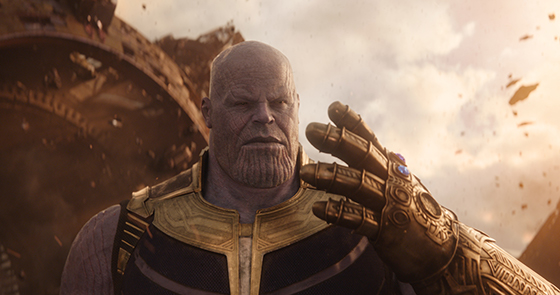Avengers: Infinity War
In its first act, AVENGERS: INFINITY WAR vacillates between humor and terror to the point of whiplash. Comedic jabs criss-cross with somber moments…

Josh Brolin as Thanos in AVENGERS: INFINITY WAR.

Note: Critical analysis always contains spoilers.
In its first act, AVENGERS: INFINITY WAR vacillates between humor and terror to the point of whiplash. Comedic jabs criss-cross with somber moments telegraphing the studio’s sense that the 160-minute slog upon which we’re about to embark is plagued with the self-serious portents of a disaster porn epic.
A decade into its perpetual franchise, Marvel’s purple-tinted sociopath with a corduroy chin, Thanos (Josh Brolin), appears to collect the Infinity Stones so he can end his misery, and ours, with a snap of his fingers and eliminate half the life in the universe. His motivation? His own planet was stupid enough to exhaust its resources so he’ll just rob trillions of other planets of theirs in the hopes that entropy, a natural property of all closed systems, will just cease. Thanos is an idiot, but neither he nor the filmmakers know this.
To save the universe, The Guardians of the Galaxy (Chris Pratt, Zoe Saldana, Bradley Cooper, Vin Diesel), Thor (Chris Hemsworth), Tony Stark (Robert Downey Jr.), Captain America and Bucky (the under-utilized Chris Evans and Sebastian Stan), Doctor Strange (Benedict Cumberbatch), Spider Man (Tom Holland), Scarlet Witch (Elizabeth Olsen), and Scarlett Johansson’s disturbingly over-bleached eyebrows scramble to safeguard the remaining stones.
Ultimately, though, Thanos uses each of the Infinitely Exploitable Plot Devices to break all the conventional rules of dramatic conflict, bending space and time in whatever way necessary to advance the plot toward inevitable cataclysm from which the heroes will cathartically, and absurdly, return.
Once again, the stakes seem irrelevant since someone will at some point snap them all back into existence no matter who dies. And, as in the comics, this could go on forever. Captain America, Superman, and many other superheroes and villains have all died, been resurrected, reborn, replaced, etc. etc. ad nauseam.
Every closed system leads to entropy, to disarray. And similarly, the franchise is such disarray; it forgets itself. In THOR: RAGNAROK, Odin says, “Are you Thor, the god of hammers?” But now Thor needs another weapon. “Asgard is not a place,” yet the people of Asgard are abandoned completely in the narrative that picks up in the opening scene. Thanos wants to destroy this Universe, never mind the infinite timelines and universes as revealed in DOCTOR STRANGE? Speaking of the good Doctor: He can defeat Dormammu, a god-like being beyond time, but he cannot defeat Thanos whose entire reality is bounded up in a nut shell?
That’s not to say the film is entirely worthless… In one of Stark’s more glib moments, he refers to Thanos’ errand boy, Ebony Maw (the oddly mesmerizing voice of Tom Vaughan-Lawlor), as Squidward of SpongeBob Squarepants fame. Listening to Alan Silvestri steal bits of the Raiders March and The Planet Krypton from master plagiarist John Williams is almost entertainment unto itself.
After ten years of circuitous one-upping one paint-by-numbers plot after another, INFINITY WAR ends on a note puzzling for fans, infuriating for critics, and simply unimaginative. Characters have chased MacGuffins across the cosmos, wasting two thirds of the film getting from one place to another, and not actually wrestling with their inner demons. Instead, they’re wrestling with cheeky filler and things turning into bubbles.
Early in the franchise, in the first AVENGERS film, Bruce Banner (Mark Ruffalo) says the saddest thing, “I’m always angry. That’s my secret.”
It’s a striking admission to hear, and a relatable one. A precursor to the contemporary superhero movie, M. Night Shyamalan’s UNBREAKABLE (which completes its trilogy in January 2019 with the upcoming GLASS), grounded the psyche of heroes and villains in real world dilemmas and motivations.
If writers Christopher Markus and Stephen McFeely, and co-directors Joe and Anthony Russo, had any pull at all (and they probably didn’t), the Oracle should have known that Thanos was lying or doesn’t know what love is and therefore has nothing to sacrifice. So he lets him make the Faustian bargain that blows up in his face, and instead of half of all life snapping out of existence, it is Thanos himself who does. Then, he awakes in a purgatory of his own making, where the child Gamora tells him that he is the imbalance in the Universe.
But watching the film and its endless factory of computer-generated sets which elicit placid line readings from actors who never know to whom or what they’re reacting, left me longing for the tactile intimacy of THE WINTER SOLDIER. In contrast to the tonally exploitative, post-9/11 catastrophe smut of the Avengers tentpoles, the former plays as a clever espionage thriller built on political intrigue, disguised as a comic book movie. It doesn’t rely on endless comic jabs because it isn’t clumsily handled, like Wanda and Vision’s (Paul Bettany) stilted romance.
Speaking of stilted romances…
Around 2005, Marvel settled a lawsuit with its former Chairman, Stan Lee who is often seen as the face of Marvel. In 2009, Marvel Studios was purchased by Disney for $4 billion, and since has grown a franchise worth over $12 billion—1200 times what was settled with Lee who still appears in cameos and at conventions to sell a product from which he no longer profits.
While some are cheering on the decade of formulaic mediocrity that Marvel, and its parent Disney, has dished out, stories emerge of Lee, saddled with debts incurred at the advice of seedy hangers-on as the Marvel execs look the other way and sift through an endless back catalogue of stories to plunder—purchased for a song.